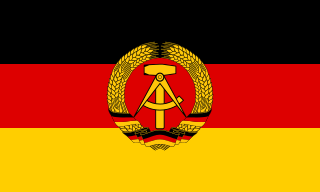Related Research Articles

Athletes from East Germany competed at the 1972 Summer Olympics in Munich, West Germany. 297 competitors, 231 men and 66 women, took part in 161 events in 18 sports.

Athletes from East Germany and West Germany competed together as the United Team of Germany for the last time at the 1964 Summer Olympics in Tokyo, Japan. 337 competitors, 275 men and 62 women, took part in 159 events in 19 sports.

Athletes from East Germany and West Germany competed together as the United Team of Germany at the 1960 Summer Olympics in Rome, Italy. 293 competitors, 238 men and 55 women, took part in 148 events in 17 sports.

Germany was represented at the 1956 Summer Olympics by a United Team of Germany of athletes from the Federal Republic of Germany (FRG) and, for the first time at Summer Games, also from the German Democratic Republic (GDR) which had not joined in 1952. Also, the Saarland athletes who had to enter as a separate team in 1952 could now join in even though the accession of their state was not yet in effect. Thus, this was the only Olympic team ever to comprise athletes from three German states.

Athletes from West Germany competed at the 1968 Summer Olympics in Mexico City, Mexico. It was the first time that East Germany and West Germany sent separate teams to the Summer Olympic Games. 275 competitors, 232 men and 43 women, took part in 154 events in 17 sports for West Germany. As the country hosted the next Olympics in Munich, the West German flag was raised at the closing ceremony.

Athletes from East Germany competed at the 1968 Summer Olympics in Mexico City, Mexico. 226 competitors, 186 men and 40 women, took part in 124 events in 18 sports. It was the first time that West Germany and East Germany had sent separate teams to the Summer Olympic Games.

Austria competed at the 1948 Summer Olympics in London, England. 147 competitors, 115 men and 32 women, took part in 79 events in 17 sports.

Austria competed at the 1952 Summer Olympics in Helsinki, Finland. 112 competitors, 91 men and 21 women, took part in 70 events in 16 sports.

Germany competed at the 1952 Summer Olympics in Helsinki, Finland. 205 competitors, 173 men and 32 women, took part in 123 events in 18 sports.

Germany was the host nation and top medal recipient at the 1936 Summer Olympics in Berlin. 433 competitors, 389 men and 44 women, took part in 143 events in 22 sports.

Germany competed at the 1928 Summer Olympics in Amsterdam, Netherlands. Germany returned to the Olympic Games after not being invited to both the 1920 and 1924 Games. Despite a total absence of 16 years since 1912, German athletes were ranked 2nd. 295 competitors, 260 men and 35 women, took part in 95 events in 16 sports.

The Union of South Africa competed at the 1960 Summer Olympics in Rome, Italy. 55 competitors, 53 men and 2 women, took part in 46 events in 12 sports. After these Olympics, the International Olympic Committee banned South Africa from the Olympic Movement over the policy of apartheid, making these the last Olympics at which South Africa would compete until the repeal of apartheid and the 1992 Summer Olympics in Barcelona, Spain.

Jörg Lucke is a retired East German rower. He won a bronze medal in the eights at the 1966 World Championships and an Olympic gold medal in the coxless pairs in 1968. After that he competed in the coxed pairs with Wolfgang Gunkel. Together they won the European title in 1971, the Olympics gold medal in 1972, and the world title in 1975, placing second in 1974.
Heinz-Jürgen Bothe is a German rower who competed for East Germany in the 1968 Summer Olympics.

Wolfgang Gunkel was an East German rower who mostly competed in coxed pairs together with Jörg Lucke. In this event he won the European title in 1971, the Olympic gold medal in 1972, and the world title in 1975. His crew placed fourth at the 1968 Olympics. Gunkel won another world title in the men's eight in 1977. In February 1978, he was given the sports awards Honoured Master of Sports.

Klaus-Dieter Neubert is a retired East German rowing coxswain, who had his best achievements in the coxed pairs, together with Wolfgang Gunkel and Jörg Lucke. They won the European title in 1971 and the Olympic gold medal in 1972, and finished second at the 1973 European and 1974 World Championships. Neubert placed fourth at the 1968 Olympics with another crew.
Karl-Heinz Prudöhl is a German rower who competed for East Germany in the 1976 Summer Olympics.

The men's coxed pair competition at the 1972 Summer Olympics in Munich took place from 27 August to 2 September at the Olympic Regatta Course in Oberschleißheim. There were 21 boats from 21 nations, with each nation limited to a single boat in the event. The event was won by East German crew Wolfgang Gunkel, Jörg Lucke, and coxswain Klaus-Dieter Neubert; it was the first medal in the event for East Germany as a separate nation. Czechoslovakia (silver) and Romania (bronze) also won their first medals in the men's coxed pair.
Eric Lucke was a South African sports shooter. He competed in the trap event at the 1960 Summer Olympics.
Günther Zumkeller is a German rower who represented West Germany.
References
- Evans, Hilary; Gjerde, Arild; Heijmans, Jeroen; Mallon, Bill; et al. "Heinz Lucke". Olympics at Sports-Reference.com. Sports Reference LLC. Archived from the original on 2011-08-16.